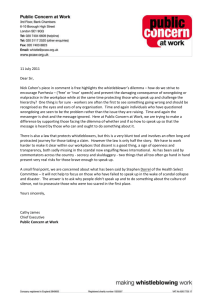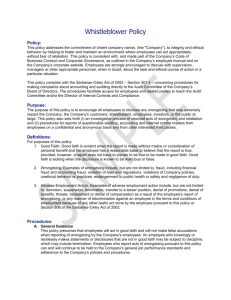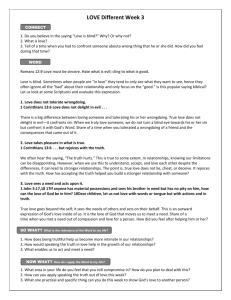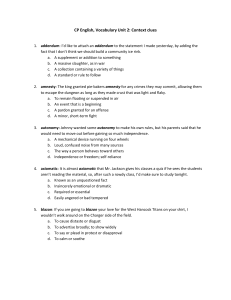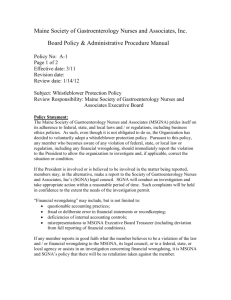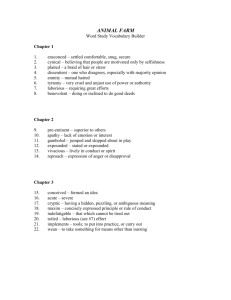Whistleblower_Policy_v_6_clean_10-13
advertisement
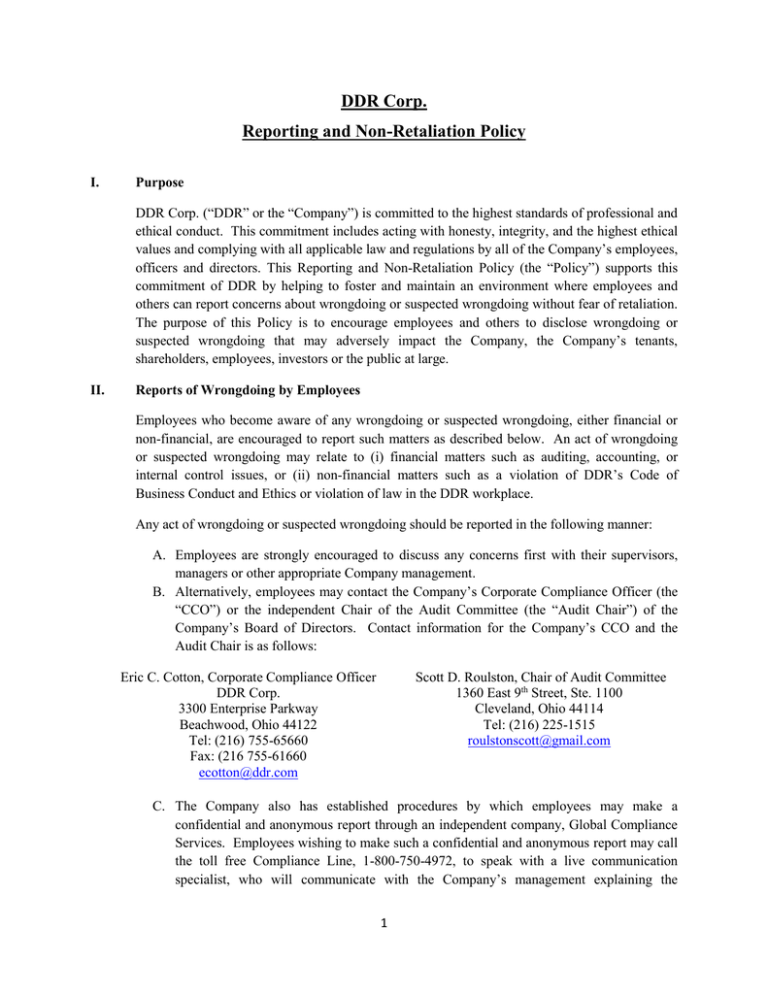
DDR Corp. Reporting and Non-Retaliation Policy I. Purpose DDR Corp. (“DDR” or the “Company”) is committed to the highest standards of professional and ethical conduct. This commitment includes acting with honesty, integrity, and the highest ethical values and complying with all applicable law and regulations by all of the Company’s employees, officers and directors. This Reporting and Non-Retaliation Policy (the “Policy”) supports this commitment of DDR by helping to foster and maintain an environment where employees and others can report concerns about wrongdoing or suspected wrongdoing without fear of retaliation. The purpose of this Policy is to encourage employees and others to disclose wrongdoing or suspected wrongdoing that may adversely impact the Company, the Company’s tenants, shareholders, employees, investors or the public at large. II. Reports of Wrongdoing by Employees Employees who become aware of any wrongdoing or suspected wrongdoing, either financial or non-financial, are encouraged to report such matters as described below. An act of wrongdoing or suspected wrongdoing may relate to (i) financial matters such as auditing, accounting, or internal control issues, or (ii) non-financial matters such as a violation of DDR’s Code of Business Conduct and Ethics or violation of law in the DDR workplace. Any act of wrongdoing or suspected wrongdoing should be reported in the following manner: A. Employees are strongly encouraged to discuss any concerns first with their supervisors, managers or other appropriate Company management. B. Alternatively, employees may contact the Company’s Corporate Compliance Officer (the “CCO”) or the independent Chair of the Audit Committee (the “Audit Chair”) of the Company’s Board of Directors. Contact information for the Company’s CCO and the Audit Chair is as follows: Eric C. Cotton, Corporate Compliance Officer DDR Corp. 3300 Enterprise Parkway Beachwood, Ohio 44122 Tel: (216) 755-65660 Fax: (216 755-61660 ecotton@ddr.com Scott D. Roulston, Chair of Audit Committee 1360 East 9th Street, Ste. 1100 Cleveland, Ohio 44114 Tel: (216) 225-1515 roulstonscott@gmail.com C. The Company also has established procedures by which employees may make a confidential and anonymous report through an independent company, Global Compliance Services. Employees wishing to make such a confidential and anonymous report may call the toll free Compliance Line, 1-800-750-4972, to speak with a live communication specialist, who will communicate with the Company’s management explaining the 1 reported issue. Employees wishing to remain anonymous will receive a report identification number, a unique PIN number and a follow-up date on which Compliance Line operators will be able to communicate management’s response. The compliance line is available 24 hours a day, seven days a week. Additionally, employees wishing to make anonymous reports may do so via the internet on the secure Compliance Helpline website hosted by Global Compliance Services, www.compliance-helpline.com. The following username and password should be used to access the Company’s page: Username: DDR; Password: Whistleblower III. Reports of Wrongdoing by Third Parties Persons other than employees may submit reports or claims of wrongdoing or suspected wrongdoing to the Company by (i) contacting the Company’s CCO or Audit Chair or (ii) using the Compliance Line and/or Compliance Helpline website as described above. IV. Investigations For each reported instance of financial or non-financial wrongdoing, an inquiry or investigation will be undertaken by the CCO or Audit Chair. The CCO and/or Audit Chair will determine the appropriate scope, procedures, and resources for any inquiry or investigation based on the facts and circumstances of a reported matter. A confidential file for each report or complaint will be maintained in accordance with the Company’s records retention policy. Results of all investigations will be reviewed on a quarterly basis by the CCO and the Audit Chair. The CCO and Audit Chair will report to the Company’s Board of Directors at least annually. The CCO and the Audit Chair may utilize internal resources (e.g. members of the Company’s Human Resources, Internal Audit, or Legal Departments) as well as external resources (e.g. external legal counsel, accounting or consulting services, etc.) to assist in the investigation as deemed appropriate. All support resources will report directly to the CCO or Audit Chair regarding investigations. V. No Retaliation Regarding Reports of Wrongdoing The Company shall not take adverse employment action against an employee in retaliation for: A. Any reports of actual or suspected financial or non-financial wrongdoing made in good faith; B. Providing information or causing information to be provided, directly or indirectly, in an investigation conducted by the Company or any federal, state or local regulatory agency or authority; C. Reports concerning the violation of any applicable law, rules or regulations, including those governing safety, health, discrimination, and harassment; D. Participating in an investigation, hearing, court proceeding or other administrative inquiry in connection with a report of wrongdoing. This Policy is intended to encourage the reporting of wrongdoing or suspected wrongdoing by the Company’s employees and presumes that employees will act in good faith and will not make 2 false accusations. An employee who knowingly or recklessly makes statements or disclosures that are not in good faith will be subject to discipline, which may include termination of employment. Any claims of adverse employment action in retaliation for the reporting of financial or nonfinancial wrongdoing under this Policy should be submitted to the CCO or Audit Chair for investigation. VI. Definitions For purposes of this Policy, the following terms shall have the meanings set forth below: A. Good Faith. Good faith is evident when the report is made without ill intent or consideration of personal benefit and the employee has a reasonable basis to believe that the report is true; provided, however, a report does not have to be proven to be true to be made in good faith. Good faith is lacking when the disclosure is known to be malicious or false. B. Financial Wrongdoing. Examples of financial wrongdoing include, but are not limited to, fraud, including fraud relating to audit, accounting or internal control matters, any violation of securities law, violation of any rule or regulation of the Securities and Exchange Commission and any violation of federal law relating to fraud against shareholders. C. Non-Financial Wrongdoing. Examples of non-financial wrongdoing include, but are not limited to, violations of the Company’s Code of Business Conduct and Ethics or other Company policies, sexual and racial harassment, violations of state and federal employee safety and health laws and any other illegal activities. D. Adverse Employment Action. Examples of adverse employment action include, but are not limited to, demotion, suspension, termination, transfer to a lesser position, denial of promotions, denial of benefits, threats, harassment or denial of compensation as a result of the employee’s report of wrongdoing, or any manner of discrimination against an employee in the terms and conditions of employment because of any other lawful act undertaken by the employee pursuant to this Policy, Section 806 of the Sarbanes-Oxley Act of 2002 or the Dodd Frank Wall Street Reform and Consumer Protection Act. Last Revised: 2015-10-13 3
